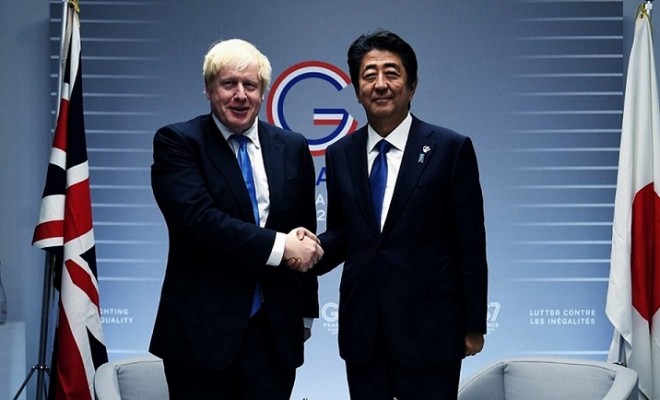
He’s no Trump, but Boris may be Britain’s Shinzo Abe
A lot changed in British politics on December 12. One thing that didn’t was the tendency to draw misleading comparisons between Boris Johnson and foreign leaders. The most common, and arguably the silliest, is the idea that Johnson is “the British Trump” — a claim made by the President himself and peddled by Jeremy Corbyn (to little effect) ahead of last month’s election. Others seek to lump the Prime Minister in with the continent’s right-wing populists such as Viktor Orban and Matteo Salvini. Notwithstanding one of his advisers’ freelancing in Budapest this month, this is not a crowd that a metropolitan Tory like Johnson would feel especially comfortable in.
But in spite of these unhelpful parallels, there really is some merit in looking overseas to understand the new landscape that British politics is in. One intriguing and potentially illuminating comparison is with Johnson’s Japanese counterpart, Shinzo Abe.
Abe, like Johnson, is a centre-right leader sometimes lumped in with the populists; Steve Bannon once called him “Trump before Trump”. As with Johnson, this misses the point.
Unlike many of those they are compared to, neither Johnson nor Abe are outsiders. Johnson’s CV is hardly unusual for a Conservative prime minister, while Abe hails from Japan’s political upper crust. But while Johnson and Abe might not be out-and-out populists, they are hardly straightforwardly establishment either. Both strike a patriotic, even nationalistic, tone; Johnson in his bulldoggish confidence that Britain can rise to the challenge of Brexit, Abe in his desire to shrug off his country’s humility about 20th century history.
In 2016, Johnson delivered an electoral earthquake with a promise to “take back control”. Four years earlier, Abe won power with the slogan “take back Japan”. Both have put the prospect of an unshackled country at the heart of their political projects: Britain’s departure from the EU in and an overhaul of the pacifist constitution written for Japan by the Allies in 1945.
Both have taken steps to deliver those promises that critics see as corner-cutting. Johnson’s prorogation of Parliament echos some of the ways in which Abe delivered his constitutional reforms. But even as the two leaders face charges of eroding norms or representing threats to democracy in much the same way as Trump, they are engaged in fundamentally different projects to that of the US president. Rather than seeking disruption for the sake of it, they are driven by a more patrician sensibility, folding populist ingredients into a conservative offering. Such an approach plots a course between foolhardy radicalism and destabilising inertia.
The nationalistic pose struck by Abe has not meant a parochial approach to global issues.
Abe has been an advocate for trade liberalisation and economic openness in the Trump era, touting the Trans-Pacific Partnership as the great hope for free trade. Johnson and many of those around him hope to use Brexit to do something similar, returning Britain to its role as a global champion of free trade. (Whether they live up to their own hype remains to be seen.)
There are also similarites in the way both men rose to the top. Abe’s second stint as Prime Minister (he briefly occupied the role in 2006-07) came at the end of a period of intense political turbulence. Japan had three Prime Ministers in the three years before he took office in 2012. Johnson may have had an uncomfortable first six months in office, but armed with a majority he is likely to oversee a period of comparative quiet compared to the preceding few years.
Συνέχεια ανάγνωσης εδώ
Πηγή: capx.co




